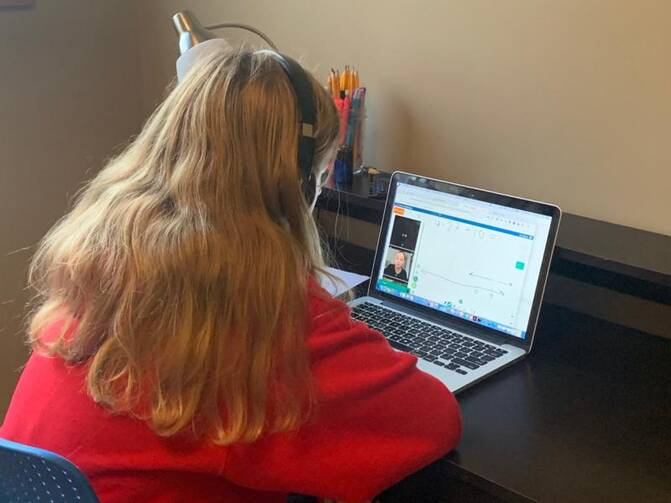VANCOUVER, British Columbia (CNS) -- With schools closed and classes being taught online, average families are having a tough enough time adapting to new routines and technologies during the ongoing pandemic. But for families of students with special needs, distance learning can be an even bigger hurdle.
"There's quite a learning curve for them," said Antonella MacGillivray, a learning support teacher at Star of the Sea School in Surrey, British Columbia.
Parents tell her it has been difficult for children who face autism, behavioral issues, learning disabilities, or other challenges to complete assignments online.
"First, there's navigating the technology, and then the fact that they are completely out of the routine," she told BC Catholic, newspaper of the Archdiocese of Vancouver. "Their learning environment is completely different. They don't have the social connections, which is a huge part, especially in the younger grades."
One-on-one, in-person learning is the cornerstone of education plans for children with special needs at Star of the Sea and other Catholic independent schools. But MacGillivray said her team of educational assistants is not about to let children with special needs feel left behind in the digital world.
"Right now, we're seeing online face-to-face (classes) over Google Meet. If that doesn't work, my job is to figure out: How do I get them to learn this time? If they are a paper and pencil kind of person, I might have to adjust that to make it work for them," she said.
Some students have a difficult time paying attention to a small screen; others struggle with dyslexia or reading disabilities; still others are hypersensitive to noise and things happening around them.
"We have to change our ways for what works for them," MacGillivray said.
Nicole Regush oversees 550 educational assistants and hundreds of other professionals as the acting director of the Catholic Independent Schools of the Vancouver Archdiocese's learning support department.
She said during the COVID-19 pandemic, she has seen efforts "bordering on heroic" when it comes to teaching children with diverse needs over long distances.
"There's a real focus on making sure the vulnerable, isolated and overwhelmed are prioritized," she said. That goes for students and parents.
"Society puts a lot on parents," and some parents and caregivers are juggling unemployment or working from home along with the educational needs of several children. For some, English is not their first language. She asks teachers to "be sensitive that what we ask is reasonable and appropriate" in unprecedented times.
Michelle, a parent who requested that BC Catholic use only her first name, said she was excited and nervous when she found out her son with complex needs would have to continue his learning online while schools were closed during the COVID-19 outbreak.
"Nothing beats in-person learning, especially with his situation," she said. "I didn't know how they would go about it." As the family adapted to virtual classes, Michelle said online learning helped her son cope with the isolation of staying home and helped him continue learning how to socialize with his peers.
"Seeing him interacting with his teachers and classmates is such a pleasure to watch," she said. "Although not all programs can be done on online learning, it is still definitely an important and breakthrough instrument."
One instrument in the toolbox of local schools is RISE at Home, a new online program by the Vancouver-based nonprofit Learning Disabilities Society. Several Catholic schools, as well as public schools, currently use the program.
"I don't think anything can 100% replace in-person learning," said Rachel Forbes, executive director of the Learning Disabilities Society. She sees their virtual program as filling in gaps "of service and routine" and offering the structured learning that "a lot of kids who are challenged with learning disabilities do really need to thrive and succeed."
RISE at Home uses video calls and an interactive online whiteboard Forbes said seems to be working quite well for many students, though "there's a huge diversity of learning needs, styles, and challenges we have to accommodate."
In the complex virtual world facing children with special needs and their families, Sandra Marshall, CISVA associate superintendent, sees a silver lining.
"Sometimes it's been easy to revert to those traditional methods. Now that people can't rely on those anymore, there's more a personalized approach to education and meeting the learners where they are at," she said. "It's reprioritizing what we're doing as educators."
Regush said it's also been a time of great creativity for teachers.
"We get used to doing things a certain way and we go about our business and it becomes rote," she said. Now, "creativity is required by necessity because we can't do things the way we always do."










